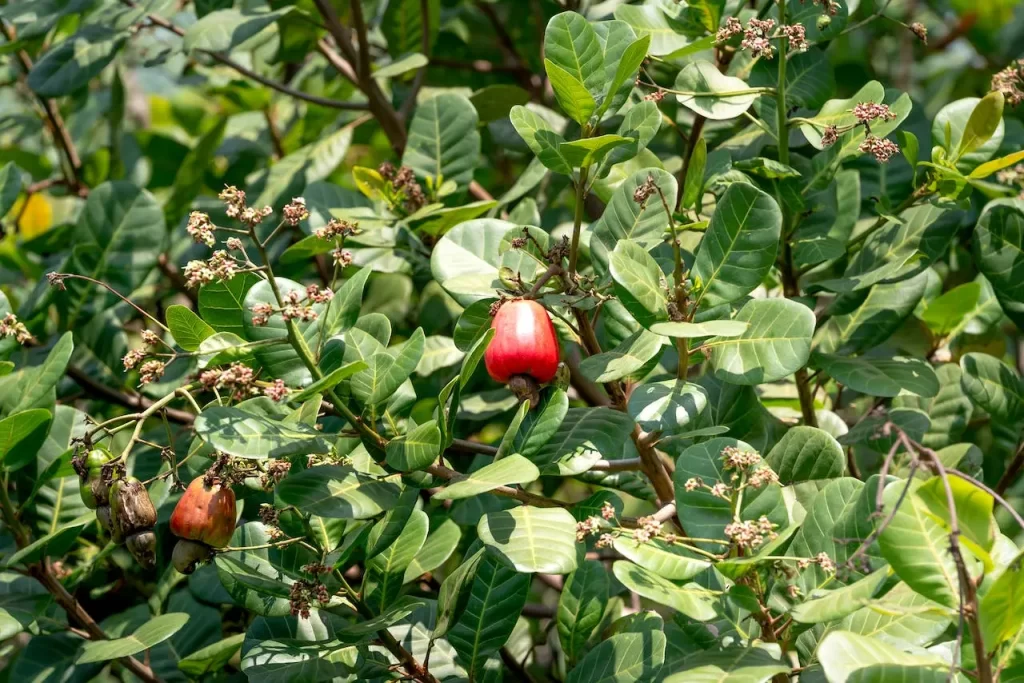Famous for its sweet taste and crunchy texture, cashew fruits are not just delicious snacks but also abundant sources of nutrients. In this article, we will discuss the nutritional content of cashew fruits, the health benefits they offer, and smart consumption guidelines.
Nutritional Content of Cashew Fruits
According to the Indonesian Food Composition Table, for every 100 grams of cashew fruits, the nutritional content is as follows:
- Water: 82.6 grams
- Energy: 64 Kcal
- Protein: 0.7 grams
- Fat: 0.6 grams
- Carbohydrates: 15.8 grams
- Fiber: 1.2 grams
- Calcium: 4 mg
- Phosphorus: 13 mg
- Iron: 0.5 mg
- Sodium: 12 mg
- Potassium: 107.8 mg
- Beta-carotene: 1,604 mcg
- Vitamin B1: 0.02 mg
- Vitamin B3: 2 mg
- Vitamin C: 197 mg
Health Benefits of Cashew Fruits
Cashew fruits can be considered as one of the foods rich in potential nutrients beneficial for health. Here are some health benefits you can obtain from consuming cashew fruits:
1. High Water Content Helps Prevent Dehydration
Water is a crucial element for maintaining body balance. Besides drinking plain water, consuming fruits with high water content, like cashew fruits, can help prevent dehydration and keep the body fresh and functioning correctly.
2. Vitamin C Plays a Role in Various Body Functions
Vitamin C is a type of water-soluble vitamin. It is essential for various body functions but needs to be consumed daily through foods or supplements.
The high vitamin C content in cashew fruits provides several health benefits, such as:
- Controlling infections
- Acting as a powerful antioxidant
- Aiding in collagen synthesis
- Supporting brain and nerve functions
3. Protection Effects of Beta-Carotene
Beta-carotene, a type of carotenoid found in cashew fruits, provides several health benefits, including:
- Supporting and maintaining eye’s health
- Controlling blood sugar levels
- Protecting the body from sunlight radiation
- Mitigating the side effects of chemotherapy in individuals with cancer
4. Potassium for Cell Functions
Potassium plays a crucial role in maintaining normal cell functions throughout the body. Its functions include:
- Regulating heartbeats
- Ensuring muscles and nerves operate optimally
- Participating in protein synthesis and carbohydrate metabolism
As a vital cofactor, potassium in cashew fruits helps ensure the smooth running of various biological processes that support body balance and health.
Cashew Fruits Consumption Guidelines
To enjoy cashew fruits wisely and reap optimal benefits, here are some consumption guidelines you can follow:
1. Choose Fresh and High-Quality Cashew Fruits
Before consumption, select fresh and high-quality cashew fruits to obtain optimal nutritional content.
2. Ensure That You Consume It in a Clean State
Like other fruits, cashew fruits should be thoroughly washed before consumption to avoid the risk of microbial contamination that could cause illness to your body.
3. Consume in Balanced Portions
Despite their delicious taste, consuming cashew fruits in balanced portions is essential to avoid excess calories and sugar intake.
4. Avoid Additional Sugar and Salt
When enjoying cashew fruits, avoid adding extra sugar or salt. Cashew fruits already have natural sweetness, and adding these ingredients will only increase unnecessary calorie and sugar intake.
5. Consider Personal Health Conditions
Ensure you have no allergies before adding cashew fruits to your daily diet.
6. Explore Different Consumption Methods
Aside from eating them straight, you can add cashew fruit to salads, yogurt, or smoothies for added flavor and nutrients.
Arummi’s Recommendation: Vary Your Cashew Fruits Consumption by Adding Cashew Milk to Your Diet!
A fun way to enjoy cashew fruits is by blending it into smoothies. Besides fruits, you can enrich your smoothies’ sweet and creamy flavor by adding cashew milk from Arummi.
You can find cashew milk from Arummi at your nearest supermarket!









































